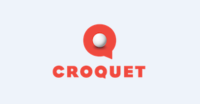Monday, March 2, 2020
Interview with David A. Smith, Croquet

For today's interview, with talked with David A. Smith, the founder of Croquet (www.croquet.io), a new Los Angeles startup which actually has its roots at the very beginning of the modern computing era. Croquet is developing software for collaborative applications, which has applications in virtual worlds and augmented and virtual reality. Croquet has a fascinating history in that its roots actually came out of the Xerox Alto—the very first computer created to support graphical user interfaces, developed by Alan Kay—with concepts first demonstrated in the famous “The Mother of All Demos” by Douglas Englebart, which demostrated many of the features we now take for granted in modern computers, graphical user interfaces, and more more than 50 years ago, in 1968.
What is Croquet?

David Smith: Croquet is a long term project. The idea is pretty simple. Imagine, when you are interacting with a real world object, you can move it around, and it's very visual and alive. You can spin a coin, pick up an object. In the real world, the idea that what you see is what I see is a central aspect of our experience. In the real world, you pick up an object, and you can hand it to seomeone else. However, in the virtual world, you just can't do that. If you think about it, in a multi-player game, for example, you have a very limited vocabulary for interaction. You can move around in the game, you can shoot someone, and you can die, but that's about it. In the real world, the quality of interaction is much more profound and complex.
What we're working on is a way to enable people to share even complicated interactions, including simulations. For example, if I were to have a room full of bouncing balls, we couldn't share that today because of the amount of information involved. It's so much that it's impossible. What we've done, is changed the way you do that. If you think about it, if you have other participants running on the same, exact computer you are, they'd be able to see the same, end result. What if we could make the same comptuer run on everyone's system, identically, so what you see and what I see is guaranteed to be exactly the same? Croquet enabled that shared computer on everyone's system, which are identical, so that anything you run is exactly the same as everyone's system. The big win is, first of all, since it looks like a single computer to the developer, they just have to program their software as a single computer. They don't have to worry about multi-player games, sending every objects to somewhere else in the world, and things bouncing back at you, and where the complexity is really, really high. For us, since it's a single computer, the program runs identically on your computer, as it does on everyone else's system, identically. The win is we don't have to exchange all that information. If you have a bunch of bouncing balls, they all bounce identically, and you don't have to exchange information.
The other nice thing about that, is as things are happening on the same computer, there is no server code to write. It's all on the client side. It's really simple to write an application, compared to the complexity of an application that is multi-user. Plus, since there is no server code running, very little latency Is required, and running the system is a tiny fraction of what it costs to run a traditional, multi-user game or application. If you can imagine these two computers running identical, and what you are seeing is exactly the same, except when you or I interact, click on something that is running, a messaage is shared with all the participants. That is the only information that needs to be shared. That means we can run with only 3.5 to 7 kilobytes per second. The comparison, is something like Google Stadia requires exchanging 20 megabits of information per second to keep that up. That's an order of magnitude difference.
How did you get into this?
David Smith: This is actually a longer term project. What happened is that Alan Kay and I met in 1990. Alan is the father of the personal computer, and invented object-oriented computing. He also led the team that created the Xerox Alto, the predecessor of the Mac and Windows. Anyone who used what Alan built in 1975 would know how to use it, as they have been using the children of that system. One of the things that happened with the Alto was that Alan and Doug Engelbart created a demonstration showing what computing could be. Things like true collaboration, the thing I'm talking about. That was on a single, shared computer. When Alan and I started talking, there were two big things we saw for the next generation of interactivity. One was 3D with augmented reality, and the other was true collaboration, what we're building. So I started working on a project, and did a prototype in 1994 and in 2000. At the time, Alan was a Senior Fellow at HP Labs when we first demonstrated Croquet, chowing complex interactive worlds. I ended up going to Lockheed Martin as Chief Innovation Officer, doing AR and VR work, creating a virtual framework used for training by the defense department. When I left there, I decided to take another carck at building this operating system. I realized, as we were building this, this multi-user collaborative platform was so powerful and neat, we should make ti available now, before the full operating system was done. We started to let people building these amazing application on their website, basically creating multi-user applications. The web is so powerful today, that Croquet allows them to now create truly collaborative applications that could not be done before. An example, is you can share a video, and we can make that video stream play identically, so what you are seeing is the one I'm seeing, as if we're using the same brain, even if you scrub left or right in the video. That's impossible using traditional approaches, which are all time based. We created Croquet as a platform to create these amazing kind of applications you just couldn't do before.
How did you get investors interested in investing in such a large project like a new operating system?
David Smith: That's a very good question. It was tricky, because this is a platform, a new kind of platform. Usually, investors like to invest in people who are taking an existing platform and extending it into a market. It helped that we had done things a few times before like this, so it really wasn't a technical problem. There are also a number of things that are occurring in the space today, one of which is we are now seeing 5G on the horizon. 5G requires a new way of thinking about how applications can work. I think of augmented reality and 5G as a communication platform, the same as a phone. Once we were able to tell the story of 5G and augmented reality, it became a lot more accessible and understandable. You're not going to be able to take a platform like Android and take it to 5G, because Android is not designed about 3D, and not around communications collaboration. Once that we finally posited that we could be a platform for 5G and Augmented Reality, that made sense for certain kinds of investors, such as telcos, to understand why it's important. That's what happened here. What we're doing with our next generation platform, is extending it to 5G, as an essential part of the next rollout. I should mention, we were going to Mobile World Congress with Ericcson to demonstrate this on 5G until the conference was canceled, and we're running on an AR device with a partner of ours. We are the core platform for the next generation of AR on 5G, and I think that's the turning point for understanding the need for this, and indeed that we're building a new paradigm for what's occurring.
Are Android and iOS then your competition?
David Smith: Actually, we work on them. Right now, we're a web-based solution, and we have additional game engine solutions going forward. For our software on Android and iOS, the trick with those systems, is they're closed, but the web is open. In the short term, our new applications are built on top of those platforms. You can see our software running on your phone today, and you don't have to download anything. Everything in the future is going to be collaborative, and every applicatino you run on augmented reality is multi-user, so that makes whether you are running Android or iOS irrelevant. I suspect when you see Apple's new OS, it's not going to be iOS, it's going to be something very different. The aesthetics and mechanics of the next generation of those platforms will be different. It's as big as the different from when we were switching from DOS to Windows machines. I see us coexisting with those platforms today, but in the future, I see that as a new kind of thing, Croquet is basically the kernel of that next generation of operating systems.
When will people be able to see apps running on your system?
David Smith: We actually have customers now. Queue.gg is building a shared video app for eSports, where you can do a John Madden, stop the video, draw on it, with multi-user capability. If you go to Croquet.io, you can actually sign up for our SDK, and that SDK is kind of neat. It shows you how to build apps, and there are working apps in the SDK that you can try out that are multi-user. You can literally put a QR code in your phone, and launch an app in your phone, share it with your PC, or share it with another person, all with the same capabilities. It's all working. Because it's all working today, and investors see we are getting traction with this, it became an easier investment.
What are the biggest challenges for your company?
David Smith: It's weird. I had an introduction to someone last month, sent them a deck, and he was just convinced what we were talking about couldn't be done. I was able to get a meeting with him, and show what we could do, and that it was real, and he told me it was the most amazing thing he'd ever seen. That's a big part of the challenge. The other thing, is that people don't realize how impressive and amazing this is, until they get an opportunity to get a demo. Because it's such a new kind of technology and approach, telling that story has been our biggest challenge, telling them that it's real, that it really works, and how it will change things. If we're not careful, it can get hyperbolic very quickly, because it's like we've sort of invented a new protocol. It's hard to break through until people see a demo running of it, but they're beginning to see that now. When they see we can do a multiplayer game, with just a trick of information, shared Ais, and thousands of bots running around the screen, all running at the same time and identically, showing that we can have a level of complexity you couldn't get any other way, it's a magical thing. That's the biggest challenge, convincing people that it's real.
Thanks, and good luck!